#as inconsistent as ponge could be i think that's a good statement
Text
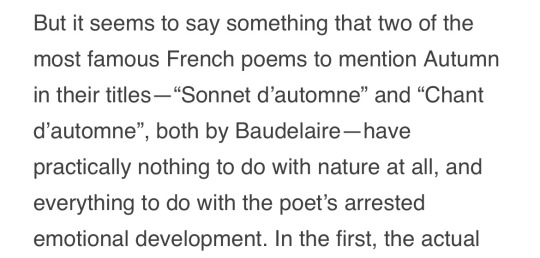
I've definitely lost interest in 'traditional' lyric poetry like that. But that's not to discount the emotional or expressive completely!
“I am not a poet,” [Ponge] declares, “I try to start from the object and be as objective as possible. My feelings undoubtedly intervene afterwards, but the “Revolution” is, instead of using the rain to express my feelings, to describe the rain, and because I am a man the same words which are used to describe the rain, also serve to express emotions.
#as inconsistent as ponge could be i think that's a good statement#when he's at his best#francis ponge#my aesthetic
3 notes
·
View notes
Text
Iron Fist Review
Before we get to the nits n grits of it, let’s get the big yellow elephant out of the way ok?
No, I was not displeased that Danny was played by a white person. If you follow me you’d know by now my many, many, many complaints about the problems with this way of thinking about identity politics and ‘representation’ and whether or not that is something minorities should even want or clamor for in order to attain...well I was gonna say equality, but I’m not even sure that’s what all this butthurting about ‘representation’ is really about. In any case, I wouldn’t have minded if they cast an Asian man in the role...though for the life of me no one can seem to give a good argument (that I’ve seen so far) as to how/why having an Asian man do kung fu on screen is somehow not stereotypical or regressive. AND really, at the end of the day, would you really have wanted the blame for this...not so stellar Marvel-Netflix writing be placed at the feet of casting an Asian man in the lead role?
And so, we’re off.
Let’s start with some things I liked.
I think this was a pretty solid attempt in portraying Danny Rand on screen, and in some ways they succeeded. Danny, to me, has always been this kind of bumbling, emotionally naive man-child who, while being super competent in areas of kung fu, is nonetheless hobbled by his inability to be on the same plane of feeling and interacting with people around him. The show really hammers this point home, unfortunately in some instances, to it’s own detriment.
I also enjoyed the ways in which the Hand was developed, though the notion of having different Hand factions operating is ultimately undercut since all of them seem to be assholes in one way or another. Expanding the lore to include Davos as well as an (admittedly TERRIBLE) appearance of Bride of 9 Spiders was also a nice touch.
Rosario Dawson’s Claire Temple, as usual, provides much needed snarky comic relief and voice of reason to the proceedings, though even she at some points strained my patience since she repeatedly was made to forcibly state things that should have been painfully clear to anyone with a minimal IQ and basic listening/comprehension skills. Jeryn Hogarth was flawless, as usual, and I would be much in support of Marvel greenlighting a whole season of just her being legal-snarky. I’m not even kidding.
Hmm, I can’t seem to not critique so we might as well get to that part, which unfortunately, is what will stay in my mind in regards to this Marvel Netflix outing.
God bless the actors, they do their best, but the material they’ve been given was just...awful.
The show lacks any kind of thematic or story structure that may have deployed many of the threads it was playing with to better effect. The show just could not decide what it wanted to be or what kind of story it wanted to tell. Is this the story of Danny coming back to reclaim his father’s company from the Meachums? Is this story about Danny coming to terms with his abandonment issues and the why he left Kun Lun? Is this story really about the Meachums’ twisted familial relationships? Who knows? I don’t think the writers did either as all of these themes get mushed up in a way that none of them really end up being compelling or interesting. Each of the previous Marvel Netflix installments had one theme that it pursued throughout the season...and it’s that clear mission statement that was missing from Iron Fist.
Characters are written so inconsistently that one is at pains to discern why they keep doing the things they do on screen. Danny’s naivete is portrayed so as to make that aspect of his character not charming or forgivable, but rather to make him look like an irredeemable spoiled brat and idiot, with none of the savant. Joy’s reaction to discovering that her father is still alive defies belief, as well as Danny’s continual trust of the elder Meachum. The character turns given to Ward and Joy make little sense as well, as they ping-pong back and forth throughout the season between wanting to help and support Danny to wanting to oust him. Colleen Wing is the sole exception, as she at least is given a clear and discernible arc that allows her character to develop in the course of the season.
But perhaps, the show’s biggest failure is it lack of...pizzazz. For god’s sake Marvel...this was a show whose raison d’etre is FLASHY KUNG FU. Holy shit, did we get NONE of that. All of the fight scenes were so painfully generic and paint by the numbers. We don’t get any of the fantastic flourishes that Danny’s moves have in the comics...though I suppose this may just be a matter of translation failure. The captions that name and accompany some of his fighting moves in the comics do a lot of the work of making each move unique and a fun tidbit of reading Iron Fist...a notion that’s harder to translate into a live action format...but the show would have benefited immensely had Danny’s fighting style been given some character and flair. AND...we didn’t even see Kun Lun. And Shou Lao the Dragon was reduced to...two pinpricks of red light?! (I was getting Galactus as a giant gas cloud flashbacks) It would have been fantastic to actually see Danny’s training in Kun Lun, rather than just have him telling us about it. Isn’t that one of the cardinal sins of TV story telling? Show us, don’t tell us.
Iron Fist emerges as the weakest, so far, of Marvel’s Netflix offerings. Sloppy writing, uninspired fight choreography and a lack of thematic focus unfortunately derailed what could have been the Marvel-Netflix partnership’s most interesting offering to date. I’m not sure if a second season is in the wings, but unless Marvel fixes some of these basic issues in the show’s architecture, this is one immortal weapon which should be shelved indefinitely.
1 note
·
View note
Photo

Bert Huyghe
A long-term thing, at least for the moment.
Nederlandse vertaling
Date of interview: November, 2017
Estimated reading time: 12 minutes
Before visiting his studio, we meet up with Bert Huyghe (°1989, Eeklo) in a Ghentian sandwich parlor, the city being his artistic headquarters since many a year. Apart from the late post-punk band Ping Pong Tactics, the countless releases and booklets, the Geuzenprijs awarded essay The Boxer and his slightly provocative, sometimes hilarious performances, Huyghe especially manifested himself as a painter, producing thickly layered, colorful canvases, instantly recognizable by their smeary charm. With clumsy virtuosity they speak of painting itself, in all it’s treacherous self-evidence. Since 2017, Huyghe is represented by Brussels’ Rossicontemporary, alongside a.o. John Van Oers, Luc Deleu, Lore Stessel and Ritsart Gobyn.
Some time later we find ourselves in the centre of creation. Some recent works are being put up for us: a collection of football shirts, dangling from an imaginary clothesline on the studio wall in a familiar candy and Nickelodeonlike color spectrum. An eclectic mix tape of Bruce Springsteen and trap is stuffed inside the cassette player. Bert talks without uh’s, sometimes thoughtful, then again floating on a linguistic rapid. We’re caught up in a discussion on the social position of the artist. Lots of interesting stuff has already been said and I haven’t even pressed the record button yet.

You could also say that normal life consists of making two thousand euros a month and that art and strange paintings are of no value to society whatsoever.
So Bert, why do you paint football shirts?
Well, because the forms and colors attract me. It’s not about which teams or brands they represent. They are paintings, in the first place. I don’t really want to talk about adidas, or them being a big multinational. I don’t sit at my desk first, trying to decide on whatever good cause I will engage myself for. That’s not my job. Being an artist I’d rather embrace adidas, to examine such a brand visually and show it to the world, on a highly personal level. That’s also taking your responsibility. Because I really am a nineties kid, influenced by sports clothing and television during my very nice childhood. Of course I think one should be critical and reflective. But on the other hand I can’t deny being psyched about a new pair of sneakers. I wonder: how will people look upon those brands in a thousand years? That three-stripe pattern goes back a few generations now. What does that mean for us? To investigate that also means taking one’s responsibility.
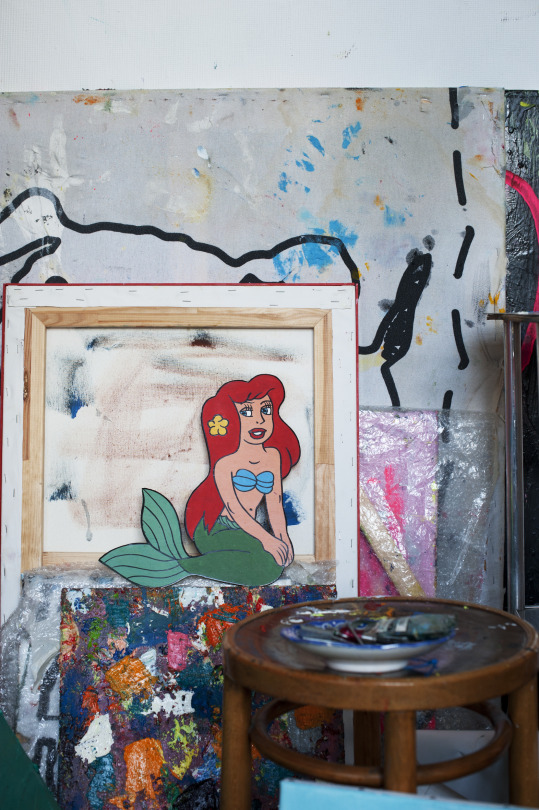
Right now we’re in a peaceful beguinage. To what extend does this environment have an influence on you and your practice?
It’s nice and quiet around here, that’s what I like about it. For me, the studio is a vantagepoint from where I can look at the world, while it’s turning upside down. You could also say that normal life consists of making two thousand euro a month and that art and strange paintings are of no value to society whatsoever. But the opposite is true: the studio is the only place of value and normality. To get back to that social aspect: I don’t think Guston painting Ku Klux Klan figures should exclusively be understood as a political statement, I presume he also did it just because he felt like painting funny shoes, or because he liked to use the color pink, or because he loved comics. Researching a medium and the world outside and what that means for you as a person, can’t be separated. You always tell something about what surrounds you. Each medium offers it’s own set of tools for doing that.
You played in a band for many years. What place does music have in your visual practice?
Music was and still is very important. I also believe Ping Pong Tactics was all about finding an honest sound. At first we where booed at for sucking at guitar - given the fact that none of us had any musical training - or for wanting to make beautiful pop songs but singing them terribly out of tune. But in doing so, we created a ground zero from which we could start all over, rather like an existentialist approach to making music. Everything’s possible, everything’s permitted, what will happen if we utilize that freedom? I also see the anachronism of that attitude. Our songs had a nostalgic touch to them, often referring to our childhood, the rural environment we grew up in. That’s also why we split up: because we outgrew it all, I guess.

Everything’s possible, everything’s permitted, what will happen if we utilize that freedom? I also see the anachronism in that attitude.

Do you miss it?
I miss the physical aspect of making music, as one can also miss the physical aspect of playing football. You should always, at a certain moment, be able to stop any collaboration. However much there is to be learned, there’s always that danger of becoming each other’s clone. Then you know the time has come for finding your own voice again.
(pauses)
To maybe answer your question: a certain childishness is also present in my paintings. It’s about therapeutically approaching my youth, I guess. Therapy is an important function of art. For the record: I did have a very nice childhood. Maybe this also makes the studio into a place of freedom, a space where you can be more like a child. At the same time, my ten-year-old self would probably say that I could make much nicer drawings than these. Thanks to the fact there really wasn’t any art where I grew up, I could approach things with an open mind once I got a little older. I often entered the room doing something that had been done a hundred times before, but just a little louder. Half the people liked it, the other half turned their backs. I didn’t really mind.
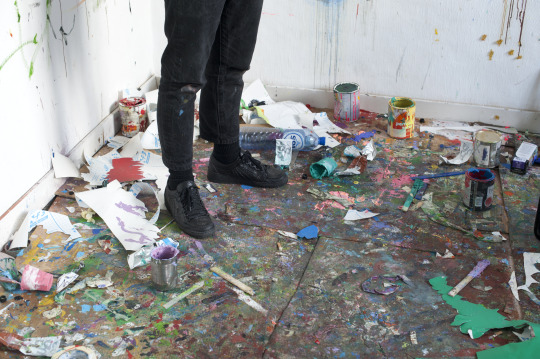
It’s about therapeutically approaching my youth, I guess. Therapy is an important function of art. For the record: I did have a very nice childhood.

Do you care about what people think of your work?
Look, I’m very glad Rossi(contemporary, red.) represents me, for example, and that they really believe in what I’m doing. This gives me time and space to seriously work towards a goal, to really accomplish something. Of course everybody sees something different in my work. When they identify themselves with themes like childhood, football or the Simpsons, that’s just great. When they think I captured an aspect of our generation, I even take that as a compliment. But the last thing I want to do is to impose an interpretation on anyone. You know, lot’s of people come in here and ask how a certain painting was made: what’s beneath this, why’s that stain there… You’re asking questions about artistry in general, social themes and such. That’s fine by me. You do your job and I’ll do mine. A child also just likes to show it’s drawing, I guess. Of course we can’t compare how a child experiences art to how an adult does. Those are two completely different things. There’s that certain cartoonish jest that I’m sampling as an adult, but in the meantime I’m really looking for a way to paint like only an adult can. I think that’s a very serious job. I believe that doing something silly in a serious way is a lot more important than … doing something silly in a silly way. (laughs)
Of course you owe a lot to history and previous generations, and this may sometimes feel like a burden. But by now I’ve distanced myself from considering Walter Swennen my dad or anything like that.
Is it still relevant to be authentic, to create something original?
I for one believe I simply am my work. I don’t really care about who’s copying what or whatever. Of course you owe a lot to history and previous generations, and this may sometimes feel like a burden. But by now I’ve distanced myself from considering Walter Swennen my dad or anything like that. However interesting I may find his work. I also learned his generation looks at the world a lot differently than ours. You see, whenever you are something, you don’t really give it a second thought. It’s just who you are, at any given moment. That’s why I don’t regret anything, artistically speaking. I do regret buying a certain sandwich, but not my art. Even bad decisions are good, if there’s something to be learned from them. I’d rather focus on the ideas still ahead of me, instead of the ones I already had. I look upon all of this as a journey that will last until I’m an old man. That’s my greatest ambition, to do this forever.

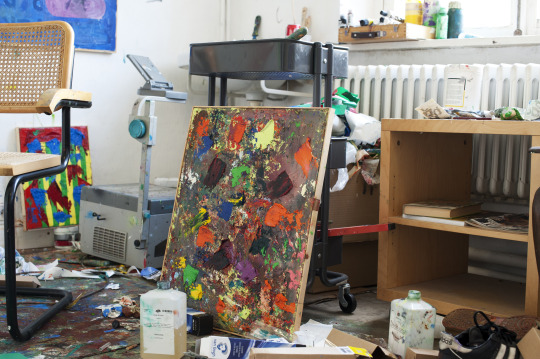
I believe that doing something silly in a serious way is a lot more important than … doing something silly in a silly way. (laughs)
You are known to produce a lot of releases and editions, be it independently or not. May we expect anything soon?
My most recent booklets or ep’s where the result of a more intense process. This felt more to the point, in a way. Like you said, my production flow used to be a lot bigger. People like Gerard Herman also taught me a lot about releases and graphics. But here again, I currently look upon myself as a painter. It’s just what consumes all of my energy right now.
I guess something important has changed in that respect. Look, this might be interesting to show you guys (takes a big painting, puts it on the wall). I call this one my Cy Twombly. I still like Twombly’s work a lot, by the way. While I was making it, I tried very much to paint in a poetic, intuitive manner. Stuff accidentally falling on the canvas, drippings, stains ... You know, right. That way it almost turned into a beautiful abstract. Something in me resisted right away. I felt like that country boy again, not fitting in with all that prettiness. So the next thing I did was put on my name in big letters. At the same time, I also couldn’t make it into a purely conceptual painting: a white canvas with my name clearly printed out. Both attitudes are in perpetual collision. I was inconsistent, which is very important for an artist. Lately I tend to lean more towards the calculated approach because I’m making a series now. I believe it’s a long-term thing, at least for the moment. In that sense my work isn’t much like Swennen’s anymore. I can’t imagine him ever making a series.

As you’ve probably noticed, some time ago it was very hip to paint these meaningless abstracts with clumsy frames around them. But the fact that it’s a gimmick doesn’t mean I’m forbidden to do it also.
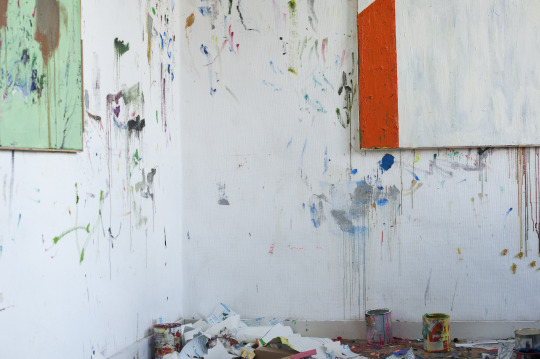
You’re working on landscapes now: a classic theme within painting. Is that part of the change you mentioned?
You know why I’m doing that? Because my grandmother once asked me when I would finally paint a landscape (laughs). My interest for The Simpsons and cartoons in general, from which I derive them, was already present. It’s just a nice coincidence that this connects to art-history. You know, we used to live in a beautiful rural area called Sint Laureins and this influenced me a great deal, but nature and landscapes we mostly just experienced like all kids do: within the artificial frame of a television set. No doubt I owe a lot to the canon. The Simpsons and football are also part of that canon, by the way. The bright colors of football shirts positioned on a pitch, the way they contrast one another: that’s painting in real life. It’s part of what attracts me in that sport. I could only find that out by intensively making lots of paintings. Constructivism was also influenced by sporting outfits, I’ve heard.
(pauses)
Actually, it’s all about painting. Everything else is just an excuse. How a painting is made, that’s what I find most important. The way I paint it, how that sets me apart from other artists. As you’ve probably noticed, some time ago it was very hip to paint these meaningless abstracts with clumsy frames around them. But the fact that it’s a gimmick doesn’t mean I’m forbidden to do it also. It’s about making an interesting image. Do I remove the black lines from a cartoon? Yes? So, why am I doing this then? Because it leaves me with plains of color, interacting with one another. That’s when it becomes a painting. Everybody thinks Lichtenstein just painted comics, for example. That’s not entirely true: he really selected those images, altered them, fixed the composition. All until they spoke as paintings, until only the right tension remained. I never dislike something somebody else has made, by the way. Worst-case scenario it’s just boring.
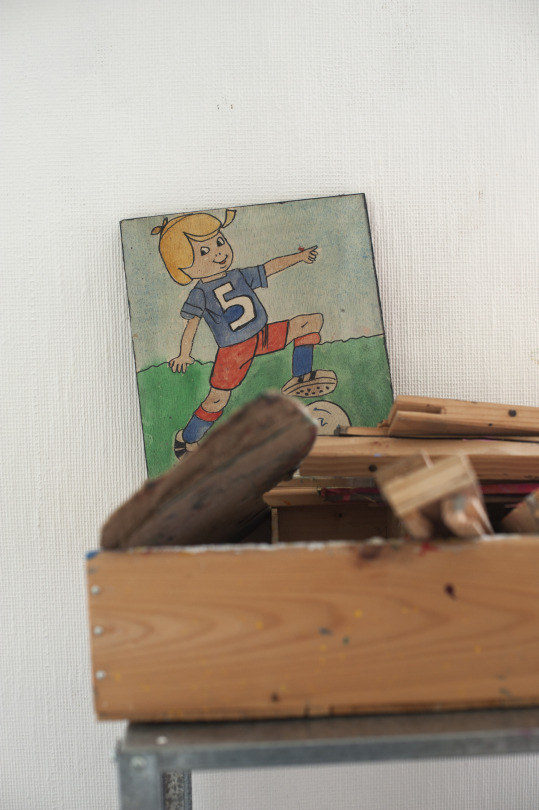
That’s the most profound quality of paintings: them being physical objects. You can just watch them as an accumulation of paint, a collection of colors. It’s a residue of an act.
Do you watch The Simpsons waiting for the right still? Or how do you start a painting like that?
No, I select images from the hundreds of interesting blogs exclusively occupying themselves with collecting Simpson’s screenshots. In that sense my method of image hunting is very contemporary. But that’s not what my work is about. I don’t really believe in the influence of, let’s say, social media on my work. I think people are still very much analogue beings. Internet and social media are just practical tools as far as I am concerned. That’s the most profound quality of paintings: them being physical objects. You can just watch them as an accumulation of paint, a collection of colors. It’s a residue of an act. To understand this, you don’t have to have any connotations. I believe, that as long as it’s good, it’ll float like oil. I don’t want to make a puzzle that has to be solved or anything. Some people like that about art, when there’s a solution. But that one solution doesn’t exist, if you ask me.
Interview and English text: Maxim Ryckaerts
English editing: Maia Daley
Photography: Sanne Delcroix
www.berthuyghe.be

_
0 notes
Text
On Airing Dirty Laundry
I find myself wanting to explain the overwhelmingly gloomy nature of this blog. It’s probably obvious, but the endless posts about narcissistic abuse partly come from a personal place. I.e., they partly come from a continuing need to explain something for which there is no available explanation. They also reflect a genuine new interest. The two things are related. I’m newly interested in the interpersonal dynamics of abuse, and in abusive personality traits, partly for personal reasons.
But these posts on narcissism, interpersonal exploitation, etc., are broadly academic. The blog’s also gloomy because I’ve been airing my dirty laundry. I’ve always done so without naming names, and with varying levels of crypticness or abstractness. I’ve always afforded plausible deniability, at the very least, to the other parties involved. It can be difficult to grasp just how important plausible deniability is, when you already know the fact that’s plausibly deniable. E.g., if you already know that you’ve done something wrong, and then this thing is stated in a way that allows you to plausibly deny it, the statement in question might still make you feel bad. It’s going to have much the same effect on you as if it hadn’t been plausibly deniable. After all, you already know every detail of the shameful fact that’s being asserted.
Nevertheless, at least some amount of restraint has been shown by the speaker, just insofar as it would have been easy for her to have been more specific. This isn’t to say that there’s no moral obligation to show such restraint. Typically there is. It’s just that we very frequently fail to do our moral duty. We frequently choose not to do our moral duty, especially when it’s a moral duty to someone who’s wronged us, or someone who’s shown little-to-none of the same kind of restraint.
More importantly, though, preserving plausible deniability is no small thing. It’s the difference between something’s being in the common ground, and not being in the common ground. When it comes to social mores, reputations, saving face, and things of this nature, the common ground is ultimately the only thing that matters.
Even more important than this, the airing of dirty laundry hasn’t been a mere self-indulgence—at least not in the perjorative sense. And it’s not something that I’ve done to punish, or that I’ve done out of spite. It’s not something I’ve been particularly comfortable with. I know it can be embarrassing, or cringeworthy. But then I’m not doing it because I think it reflects well on me, or because I expect other people to be interested in my personal issues. It’s part of a program of recovery.
Lack of closure can be really hard to deal with, and it can cause a lot of problems, especially in relation to an emotional trauma. This is part of the reason that I’ve been having problems for so long, particularly with anxiety and with obsessive and intrusive thoughts. Writing about the relevant personal events, and either sharing them or posting them somewhere public, is a recommended technique for dealing with such issues. There’s a finality and an objectivity to this, and a corresponding catharsis (however brief), that simply wouldn’t be achieved by writing in a journal or talking to a friend. It’s also something that’s advised because it guards against dissociation, and ensures that the difficult feelings and truths are actually felt rather than avoided; that they’re committed to, accepted, and (hopefully, eventually) processed.
The lack of closure is one reason. Another is cognitive dissonance. Cognitive dissonance only exacerbates the anxiety, and the obssessive and intrusive thoughts. It keeps the whole cluster fuck alive and unresolved. It’s impossible to convey how destructive this confusion has been, for me. It’s obviously related to the lack of closure, insofar as I have no information that has been able to resolve the contradictions. These contradictions aren’t merely cognitive. They’re deeply emotionally significant. I get the impression that if they’d only been contradictions in thought, then they’d have been more readily brushed aside, and forgotten about relatively quickly. In relation to this, I’ve been having emotional flashbacks, which are closely tied to the cognitive dissonance. If one of these flashbacks is triggered (it’s often triggered by my PhD, unfortunately), then it’s always a flashback into something that has an unresolved contradiction with something else that’s deeply emotionally significant. And so then I get kind of locked in this obsessive oscillation between one thing and another, like an increasingly decrepit ping pong ball.
Dissonance of this kind is a predictable consequence of narcissistic abuse—of being subjected to abrupt shifts between total idealisation and total devaluation. It’s possible for someone to alternately idealise you and devalue you in this way deliberately, in order to cause distress, destablise you, and confuse you. In more local or acute cases, it’s something that a particularly determined bully might intentionally do. But if it’s deliberately done as part of a pervasive or chronic pattern, then the person is most likely a psychopath (I mean this literally, and not in a flippant or hyperbolic sense).
Someone can also alternately idealise you and devalue you because of a defence mechanism called ‘splitting’. Roughly, someone who pervasively splits cannot tolerate certain kinds of evaluative uncertainty, and the result of this is a moderate form of psychosis. Both the self and things external to the self (including other people) are only represented as thoroughly good or thoroughly bad. Clearly, since this way of representing reality is not properly anchored to the evidence, it is also unstable. As soon as something is affecting a splitter slightly more negatively than positively, it is suddenly represented as all bad (and treated accordingly). But if it then starts to affect the splitter slightly more positively than negatively, it is suddenly represented as being all good (and treated accordingly). This can lead the splitter to abruptly shift between idealising and devaluing a person, in response to comparatively minor fluctuations in how this person is immediately affecting her. In an interpersonal context, this is narcissistic abuse.
When a person is being idealised or devalued, it always says more about the idealiser or devaluer than the person who is being idealised or devalued. As mentioned, it’s either a malicious tactic, or a defensive form of psychosis. More to the point: in reality, no one even comes close to being ideal or completely worthless (whatever this might mean). And no one abruptly shifts from being close to one extreme to being close to the other—at least not in any objective sense, based on actual personality. So to represent a person as ideal or worthless, or to abruptly shift between representing a person as one and representing a person as the other, must say more about the representation itself than about the person who is being represented.
But it doesn’t really matter if you know that this is the case. Being idealised or devalued has an adverse emotional impact on you anyway. And being subjected to unpredictable shifts between them is rapidly emotionally destablilsing, and devastating to one’s self-esteem. It also introduces obsessive and self-destructive thought patterns. Where before you had no reason to doubt your representation of reality, and your representation of yourself, now you’re thrown into this state of constantly questioning whether up is really down, and vice versa. This effect is frequently combined with invalidation and gaslighting, which only worsen the self-doubt and cognitive dissonance. These things are frequently combined with narcissistic abuse because of Cluster B personality disorders. Anyone with such a disorder is prone to splitting (or psychopathic abuse, if the disorder is ASPD) as well as to manipulating, invalidating, and gaslighting others.
What I’m trying to say is that validation has been a critical part of recovery, for me. Specifically, self-validation has been critical. Combined, all of these things can lead to a paradoxical situation, in which one knows what actually happened and yet frequently finds one’s self thinking that it didn’t really happen, or feeling as though something different happened. E.g., I spent a significant amount of time being reassured that something of deep emotional importance would always be the case. Then—after an abrupt shift—it was communicated to me, also for a significant amount of time, that the same thing would in fact never be the case, and that it had never even been the case. There was no sensible path that I could follow from one extreme to its total contradiction, and so the dissonance could not be resolved. This sort of thing fucks with your head, however robust or stable you might be. Being told by someone, A, that you’re the most wonderful person A’s ever met and that A’s never been so in love with anyone in her life, and then to be suddenly condemned and despised by A, and told by A that you’re a worthless, insufferable piece of shit; to be encouraged to feel something stable, only to be suddenly denigrated for continuing to feel this stable thing—it fucks with your head. It just does. I think that this kind of interpersonal inconsistency might fuck with your head even with a complete stranger. It definitely fucks with your head if it’s someone you trust and respect. And it brutalises your head if it’s someone with whom you’re in love.
So when I find myself launched back into ruminating on one of these unresolved contradictions, it’s traumatic. These contradictions are lodged in really deep emotional parts of me, and I can’t get them out. What’s more, I’ll often find myself entertaining doubts about what I’d otherwise know to be true, either because I’ve been gaslighted into thinking this, or because it would resolve the dissonance and its associated anxiety. That’s a problem. Resolving things in this way—by denial, repression, self-delusion, or whatever—is unhealthy. It’s what leads to the toxic over-use of defence mechanisms such as splitting in the first place. It’s why victims of abuse can end up being abusive to others. When it starts to happen, I have to try to fight it. I have to commit to what I know to be true, in some kind of visible, objective way. If that means airing dirty laundry, then that’s what I have to do. I’d prefer not to; which is to say, I’d prefer that I didn’t have a reason to. I still can’t understand how I’ve ended up here; how any of this was remotely necessary. But I hope it’s clear that if my reasons were ignoble or spiteful, then I’d have no reason to show any restraint at all, however minor this restraint might seem. It doesn’t take much. My inkling is that if we were all willing to show just a bit of restraint—if there was even just the most basic bedrock of give-and-take—then none of us would have anything to restrain in the first place.
0 notes